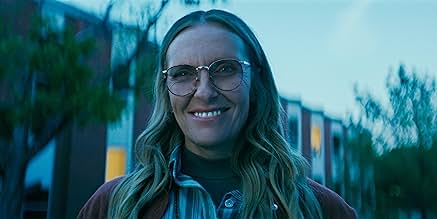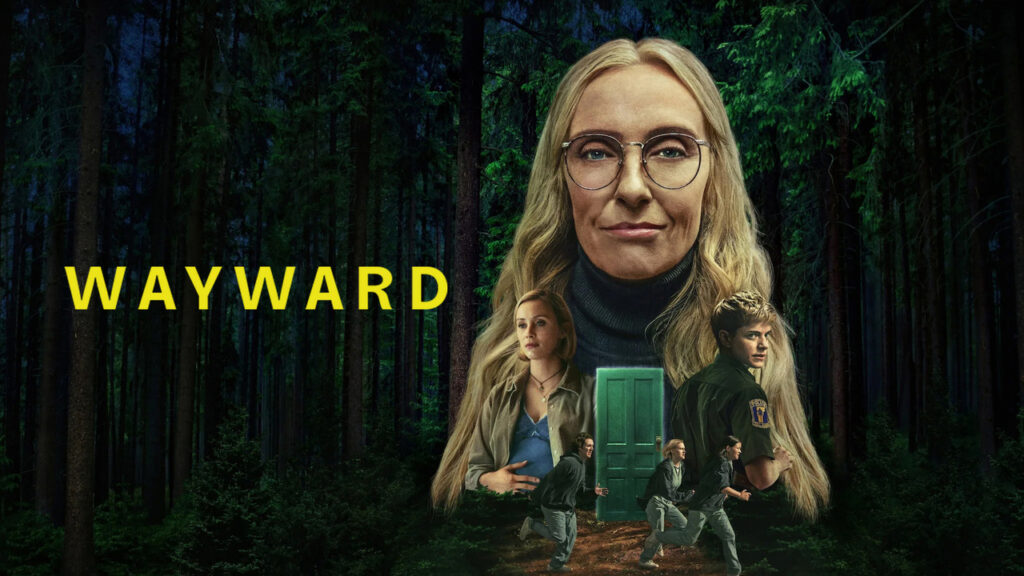Mae Martin’s Wayward premiered on Netflix on September 25, 2025, and parents are wondering: Is this psychological thriller miniseries right for my family? After analyzing the show’s content, themes, and mature elements, here’s what you need to know: Wayward is rated TV-MA for violence, nudity, drug content, and disturbing themes about the troubled teen industry, making it appropriate only for mature audiences 17 and older, despite featuring teenage protagonists.
Creator/Director: Mae Martin
Network: Netflix
Rating: TV-MA
Starring: Mae Martin, Toni Collette, Sarah Gadon, Alyvia Alyn Lind, Sydney Topliffe, John Daniel, Elizabeth Adams

Understanding the TV-MA Rating
What Does TV-MA Mean for Your Family?
The TV-MA rating means this program is specifically designed for adults and may be unsuitable for children under 17. Wayward explores the insidious intricacies of the troubled teen industry through a bucolic but sinister Vermont town, tackling mature themes that require adult understanding and context.
The TV-MA rating means:
- Content is specifically designed for mature audiences only
- May contain graphic violence, explicit sexual content, or crude language
- Not appropriate for anyone under 17
- Parents should carefully evaluate even for older teens
Personal Note: As a mother who reviews content for families, I need to be direct: this is NOT a show for teenagers, despite being about teenagers. The dark exploration of abusive teen reform programs, combined with explicit content and deeply disturbing themes, makes this strictly adult viewing. Even my 17-year-old found some scenes too intense.
Age-Appropriate Viewing Guidelines
Ages 6-16: Absolutely Not Recommended
My Recommendation: This show is not for children or teens of any age
Young people should avoid this series due to:
- Graphic depictions of abuse in therapeutic boarding schools
- Disturbing portrayals of the troubled teen industry’s harmful practices
- Drug content and substance abuse themes
- Nudity and mature sexual content
- Violence including physical and emotional abuse of teenagers
- Psychological manipulation and trauma that could be triggering

Critical Context: While the show features teen characters, it exposes the real-world abuse that occurs in some reform schools. This content is meant to educate and disturb adult viewers, not entertain young audiences.
Ages 17: Proceed with Extreme Caution
My Recommendation: Only for very mature 17-year-olds with strong parental guidance
Even at 17, viewers need to be emotionally prepared for:
- Realistic depictions of institutional abuse
- Complex themes about parental control and teen autonomy
- Potentially triggering content for anyone who’s experienced similar situations
- Dark psychological thriller elements throughout
If considering for a 17-year-old: Have serious conversations beforehand about the troubled teen industry, discuss whether they’re emotionally ready for disturbing content, and be available to process the heavy themes together.
Ages 18+: Appropriate for Mature Adults
My Recommendation: Educational and eye-opening for adult viewers
Adults will appreciate the important social commentary while being able to contextualize the disturbing content within the broader conversation about the troubled teen industry.
Content Breakdown: What to Expect

Violence and Disturbing Content
What’s Included:
- Physical and emotional abuse within the therapeutic boarding school setting
- Institutional violence against teenagers by authority figures
- Psychological manipulation and coercive control tactics
- Depictions of trauma and its lasting effects on young people
- Dark thriller elements including mysterious disappearances
Parent Perspective: The violence isn’t gratuitous but serves to expose real abuses in the troubled teen industry. However, it’s genuinely disturbing and difficult to watch, even for adults.
Sexual Content and Nudity
What to Expect:
- Adult nudity and sexual situations
- Mature themes about sexuality and relationships
- Content appropriate for adult Netflix audiences
- Sexual situations that advance plot and character development
Real Talk: The sexual content is handled maturely but is explicit enough to warrant the TV-MA rating. This isn’t suitable for teens.
Substance Use and Drug Content
What You’ll Encounter:
- Drug use depicted within the context of troubled teens
- Substance abuse as part of character backgrounds
- Medication and potential pharmaceutical abuse in institutional settings
- Realistic portrayals of addiction and its consequences
Emotional and Thematic Content
Troubled Teen Industry Themes
The series follows Alex Dempsey, a transgender man and young police officer new to Tall Pines, who begins investigating the mysterious Tall Pines Academy run by the charismatic but potentially dangerous Evelyn Wade. The show explores how therapeutic boarding schools can become sites of abuse rather than healing.
Discussion Opportunities for Adult Viewers:
- What oversight should exist for residential treatment programs?
- How do we balance parental rights with protecting children from harm?
- What makes someone vulnerable to institutional manipulation?
- How does society fail troubled teens who genuinely need help?
Important Context: This show is based on real concerns about the troubled teen industry, where some facilities have documented histories of abuse. The series serves as social commentary on a serious issue affecting real families.
Complex Representation and Identity Themes
The show features Mae Martin as Alex Dempsey, a transgender police officer, bringing important LGBTQ+ representation to the thriller genre while exploring themes of identity, belonging, and finding your place in a community with dark secrets.
Core Themes Presented:
- The dangers of unregulated therapeutic boarding schools
- Parental desperation and the vulnerability it creates
- Institutional power dynamics and abuse
- Identity and authenticity in restrictive environments
- The eternal struggle between generations over control and autonomy
Critical Reception and Impact
Expert Reviews and Ratings
The show premiered at the 2025 Toronto International Film Festival before its Netflix release and received mixed but thought-provoking reviews.
Critical Response:
- Rotten Tomatoes: 78% approval rating based on 50 critic reviews
- IMDB: 5.9/10 user rating
- Praised for Toni Collette’s chilling performance as Evelyn Wade
- Recognized for addressing important social issues about teen treatment facilities
Reviewer Insights: Critics noted that while the show doesn’t always succeed narratively, it raises crucial questions about the troubled teen industry that deserve serious adult conversation.
Practical Viewing Tips for Adults
Before You Watch
Prepare for Heavy Content:
- Research the troubled teen industry to understand the real-world context
- Be aware this content may be triggering for survivors of institutional abuse
- Set aside time for emotional processing after episodes
- Consider watching with another adult for support and discussion
During Episodes
Engagement Strategies:
- Take breaks if content becomes overwhelming
- Note the distinction between fictional characters and real-world issues
- Appreciate the performances, particularly Toni Collette’s villainous turn
- Consider the show’s social commentary purpose
After the Series
Processing Activities:
- Research legitimate concerns about the troubled teen industry
- Discuss how parents can find safe help for struggling teens
- Reflect on themes of institutional power and abuse
- Consider supporting organizations that advocate for youth safety
Expert Endorsements and Warnings
Reviewed by Dr. Patricia Anderson, Clinical Psychologist specializing in Adolescent Trauma, on September 24, 2025
Wayward tackles an important but disturbing subject matter that most entertainment avoids. While the show serves as valuable social commentary on abuses within the troubled teen industry, the content is appropriately rated TV-MA. This is educational viewing for adults concerned about these issues, not entertainment for young people, even those interested in the subject matter.
Supporting Context
According to child welfare advocates, media exposing troubled teen industry abuses can:
- Raise awareness about real problems in residential treatment
- Help parents identify warning signs of problematic facilities
- Encourage policy discussions about oversight and regulation
- Provide validation for survivors of institutional abuse
However, such content must be consumed by adults with proper context and emotional readiness.
The Bottom Line: Is Wayward Right for Your Family?
Green Light Viewers
- Adults 18+ interested in psychological thrillers with social commentary
- Mature viewers who appreciate dark, thought-provoking content
- Parents researching the troubled teen industry before considering any programs
- Fans of Toni Collette seeking her most villainous performance yet
Yellow Light Viewers
- Very mature 17-year-olds with strong parental support and guidance
- Adults who may be triggered by depictions of institutional abuse
- Viewers who prefer lighter thriller content without heavy social issues
- Those new to Mae Martin’s work expecting comedy rather than drama
Red Light Viewers
- Anyone under 17, regardless of maturity level
- Teenagers struggling with behavioral or mental health issues
- Survivors of troubled teen programs without proper support systems
- Families seeking any form of teen-appropriate entertainment
Making the Decision That’s Right for YOUR Family
Remember, despite featuring teenage characters, this show is made FOR adults, not about entertainment for young people. Consider:
- Whether adult viewers can handle disturbing content about teen abuse
- Your interest in serious social commentary versus entertainment
- Emotional readiness to process heavy themes about institutional harm
- Whether you’re prepared for content that may be genuinely upsetting
My Final Recommendation: Wayward is an important but deeply disturbing exploration of the troubled teen industry that serves valuable educational purposes for adult viewers. The TV-MA rating is absolutely warranted, and this should NOT be viewed by teenagers despite featuring teen protagonists. Parents considering any type of residential treatment program for their children should watch this series to understand potential red flags, but this is strictly adult viewing that may be emotionally difficult even for mature audiences.
The show raises crucial questions about how we treat struggling teenagers in our society, making it worthwhile for adults willing to engage with challenging content. Just ensure no young people are watching – this one’s definitely not for them.
If You’re a Parent Considering Troubled Teen Programs: This show, while fictionalized, reflects real concerns documented by survivors and advocates. Research any program thoroughly, visit in person, speak with former students and families, and never send your child to a program that restricts communication or outside contact.
External Resources:
- Breaking Code Silence (Survivor Advocacy Organization)
- American Academy of Child & Adolescent Psychiatry Treatment Guidelines
- National Youth Rights Association Resources
- Common Sense Media TV Reviews


